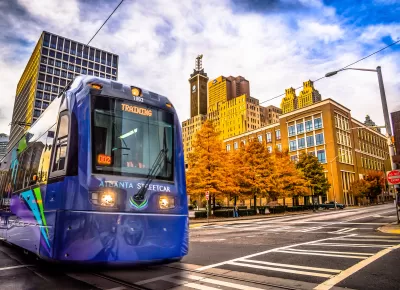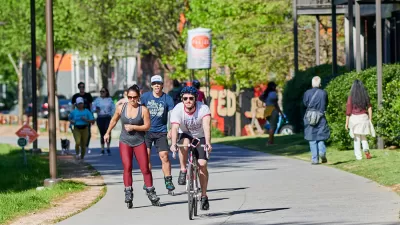The commissioner of the Georgia Department of Transportation warned Atlanta Mayor Kasim Reed and MARTA CEO Keith Parker that unless corrective actions are not taken in many areas, e.g., maintenance, safety, he will shut down streetcar service.

"In a letter to Mayor Kasim Reed and Metropolitan Atlanta Rapid Transit Authority (MARTA) CEO Keith Parker on [May 23], the Georgia Department of Transportation gave the city until June 14 to submit plans to address 60 outstanding problems outlined in the reports," writes David Wickert for The Atlanta Journal-Constitution. "If those plans are not sufficient, GDOT said, it will order the streetcar to shut down immediately."
The city and MARTA share responsibility for the $98 million system that runs in downtown Atlanta. State and federal law requires GDOT to oversee the safety and security of rail operations like the streetcar, GDOT Commissioner Russell McMurry said.
McMurry wrote that since the service started in December 2014, streetcar officials have failed to “provide timely, substantive and compliant responses to deficiencies identified by the department and (Federal Transportation Authority).”
The problems with the streetcar include poor maintenance procedures, inadequate staffing and a failure to properly investigate accidents.
Not all news was bad. In an optimistic note, McMurry informed The Atlanta Journal-Constitution that "the department expects the problems will be resolved."
But how did the problem gets to this point? Does responsibility lie with MARTA?
Last year, the Federal Transit Administration expressed concerns about the safety and operation of the streetcar. Among other things, it found defects in the streetcar’s overhead electrical system, poor operating procedures, significant management and staff vacancies and failure to comply with state accident reporting requirements.
“Clearly, MARTA’s overall ‘active management’ role, as the entity ‘directly responsible for the day-to-day management of the Atlanta Streetcar,’ has not been sufficient to date,” FTA Region IV Administrator Yvette Taylor wrote on Sep. 3, 2015, reported The Atlanta Journal-Constitution's Katie Leslie last September.
Leslie wrote in January that according to a GDOT report, "the city and MARTA lack clarity when it comes to their roles in running the streetcar." She went on to list problems the ongoing problems that ultimately led to the May 23 letter.
"State Sen. Vincent Fort, D-Atlanta, traced the problems to the city’s involvement in running the streetcar," adds Wickert. "He wants MARTA to operate the system and earlier this year introduced an unsuccessful bill that would have put the system under its control."
Ridership plummets
Meeting GDOT's reporting requirements is not the streetcar's only problem, writes Wickert.
After offering free fares for a year, the streetcar started charging $1 in January. Ridership plummeted. About 91,000 people rode the street in the first three months of this year – 48 percent less than the same period in 2015.
An April post indicated that Atlanta has "big plans to extend the line." Before expanding to 50 miles, as the city hopes, the first priority must be to address urgent operational concerns that revealed themselves in the first phase, the 2.7-mile downtown route.
FULL STORY: State threatens to close Atlanta streetcar

Alabama: Trump Terminates Settlements for Black Communities Harmed By Raw Sewage
Trump deemed the landmark civil rights agreement “illegal DEI and environmental justice policy.”

Study: Maui’s Plan to Convert Vacation Rentals to Long-Term Housing Could Cause Nearly $1 Billion Economic Loss
The plan would reduce visitor accommodation by 25% resulting in 1,900 jobs lost.

Planetizen Federal Action Tracker
A weekly monitor of how Trump’s orders and actions are impacting planners and planning in America.

Waymo Gets Permission to Map SF’s Market Street
If allowed to operate on the traffic-restricted street, Waymo’s autonomous taxis would have a leg up over ride-hailing competitors — and counter the city’s efforts to grow bike and pedestrian on the thoroughfare.

Parklet Symposium Highlights the Success of Shared Spaces
Parklets got a boost during the Covid-19 pandemic, when the concept was translated to outdoor dining programs that offered restaurants a lifeline during the shutdown.

Federal Homelessness Agency Places Entire Staff on Leave
The U.S. Interagency Council on Homelessness is the only federal agency dedicated to preventing and ending homelessness.
Urban Design for Planners 1: Software Tools
This six-course series explores essential urban design concepts using open source software and equips planners with the tools they need to participate fully in the urban design process.
Planning for Universal Design
Learn the tools for implementing Universal Design in planning regulations.
Caltrans
Smith Gee Studio
Institute for Housing and Urban Development Studies (IHS)
City of Grandview
Harvard GSD Executive Education
Toledo-Lucas County Plan Commissions
Salt Lake City
NYU Wagner Graduate School of Public Service




























